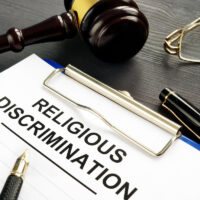EEOC Claims Religious Discrimination Where Employee Was Told “We Can’t Tolerate Religious Privileges”

Having represented victims of employment discrimination for almost two decades, our Gainesville, Florida employment discrimination lawyers are often asked whether employers must accommodate the religious beliefs of employees. Under Title VII of the Civil Rights Act of 1964 (Title VII), employers are prohibited from discriminating against employees because of their religion. Title VII also requires employers to reasonably accommodate the religious beliefs of employees, unless an accommodation would impose an undue hardship on the employer’s business. A religious discrimination lawsuit recently filed by the U.S. Equal Employment Opportunity Commission (EEOC) illustrates that employers are required by Title VII to reasonably accommodate the religious beliefs of their employees.
Employee Claims Unlawful Firing
In a press release issued on October 2, 2019, the EEOC announced that it has filed a religious discrimination lawsuit against Pediatrics 2000 (Pediatrics 2000) pursuant to Title VII. On September 30, 2019, the EEOC filed the case, U.S. Equal Employment Opportunity Commission v. Pediatrics 2000, Case No. 1:19-cv-09076, in the U.S. District Court for the Southern District of New York after initially attempting to reach a pre-litigation settlement through its statutorily mandated conciliation process. The EEOC has brought the religious discrimination lawsuit on behalf of a former employee of Pediatrics 2000, Shekinah Baez (Baez). The EEOC claims that Pediatrics 2000 violated Title VII by denying Baez a reasonable accommodation for her religious beliefs and by terminating Baez’s employment because of her religion. In this article, our Gainesville, Florida employment discrimination attorneys explain the EEOC’s allegations against Pediatrics 2000.
EEOC Alleges Religious Discrimination
Pediatrics 2000 provides health cares services in New York City. In 2000, Baez, who is a Jehovah’s Witness, began working for Pediatrics 2000. The EEOC alleges that on multiple occasions throughout her employment, the owner of Pediatrics 2000 referred to Baez’s religion as a “cult.” In September 2018, the owner instructed Baez to plan a company party to be held in December. The owner repeatedly told her that he wanted her to attend the party and that it would not be a holiday party which would conflict with her religion. Pediatrics 2000, according to the EEOC, was aware that it would be a violation of Baez’s religious beliefs to attend a holiday party, such as a Christmas party, or attend a party which involved drinking or dancing.
While planning the party, it became increasingly clear to Baez that the event would have holiday-themed decorations and entertainment that would make it inappropriate for her to attend. For example, co-workers referred to the party as a holiday or Christmas party. The caterer also informed Baez that the owner had requested “crazy hour” dancers, who would wear sexy Carnival-type outfits and encourage everyone to dance. Several employees informed the company that they would not be able to attend the party for reasons unrelated to religion. Pediatrics 2000 had no objection and did not discipline these employees for declining the party invitation.
On December 4, 2018, Baez requested the reasonable accommodation of being excused from the company party. In response to Baez’s request for a religious accommodation, the owner denied her accommodation request and immediately terminated her employment, writing, “I really hope that you understand why this is your last day of employment . . . we can’t tolerate religious privileges from anyone.” The owner wrote to Baez the following day, “I am sick of all sectarian religious people . . . and politely ask them to stay away from me as long as I live . . . I have nothing to lose by staying away from anyone associate[d] with [J]ehova[h]’s [W]itnesses.”
EEOC Fights Employment Discrimination
The EEOC is the administrative agency of the United States responsible for interpreting and enforcing federal laws prohibiting employment discrimination. In enforcing the federal anti-discrimination laws, the EEOC is also authorized by federal law to bring lawsuits on behalf of victims of religious discrimination. In a press release issued by the EEOC on October 2, 2019 regarding the case, the Director for the EEOC’s New York District Office, Kevin Berry, stated that “[o]wners and others at the top of the corporate hierarchy are not above the requirements of Title VII, including that law’s protections against religious discrimination.”
Consultation With Gainesville Discrimination Lawyers
Based in Ocala, Florida and representing employees throughout Central Florida, our Gainesville, Florida employment discrimination attorneys have almost twenty years of experience representing victims of employment discrimination in cases before the EEOC. If you have experienced discrimination in the workplace or have questions about your protection against religious discrimination, please contact our office for a free consultation with our Gainesville, Florida employment discrimination lawyers. Our employment and labor law attorneys take employment discrimination cases on a contingency fee basis. This means that there are no attorney’s fees incurred unless there is a recovery and our attorney’s fees come solely from the monetary award that you recover.